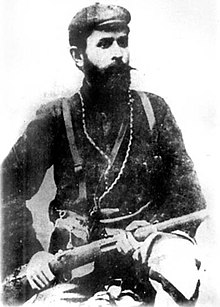Nikola Karev
| Nikola Karev Никола Карев |
|
|---|---|
 |
|
| Personal details | |
| Born | November 23, 1877 Kırşova, Ottoman Empire (now Kruševo, Macedonia) |
| Died | April 27, 1905 (aged 27) Village Rayçani (Koçana), Ottoman Empire (now Rajčani, Kočani, Macedonia) |
| Occupation | Revolutionary |
| Profession | Teacher |
| Religion | Bulgarian Orthodox |
Nikola Janakiev Karev (Bulgarian and Macedonian: Никола Карев) was a revolutionary in Ottoman-ruled Macedonia. He was born 23 November 1877 in Kırşova (now Kruševo) and died 27 April 1905 in the village of Rayçani (Rajčani), both today in Macedonia. Karev was a local leader of what later became known as the Internal Macedonian Revolutionary Organization (IMRO). He was also a socialist and a member of the Bulgarian Workers' Social Democratic Party. He is considered a Bulgarian hero in Bulgaria and a Macedonian hero in Macedonia, although by such activists, ethnic Bulgarian identity coexisted with regional Macedonian one.
Karev completed his early education in Kruševo and in 1893 moved to Sofia in independent Bulgaria. There he worked as a carpenter and his employer was the socialist Vasil Glavinov. Karev joined the Socialist group led by Glavinov, and through him, made acquaintance of Dimitar Blagoev and other socialists and became a member of the Bulgarian Workers' Social Democratic Party. In 1896 the Macedonian-Adrianopole Social-Democratic Group, as part of the Bulgarian Workers' Social-Democrat Party was created, where Karev participated. In 1898 Karev went back to Ottoman Macedonia and graduated from the Bulgarian Exarchate's gymnasium in Bitola. From 1900 he worked as a Bulgarian teacher in the region of Kruševo. The first Conference of Macedonian Socialists was held on June 3, 1900, near Krushevo, where they defined the basic aspects of the creation of a separate Macedonian Republic, as a cantonized state, part of a future Balkan Socialist Federation, with equal rights to all its citizens. They maintained the slogan "Macedonia for the Macedonians", consisting from all different nationalities, inhabiting the area, and were against the neighboring states aspirations, including Bulgarian nationalism. They also saw the future Macedonia as a multinational polity, while Macedonian people was then an umbrella term covering Bulgarians, Turks, Greeks, Vlachs, Albanians, Serbs, Jews, and so on.
...
Wikipedia
